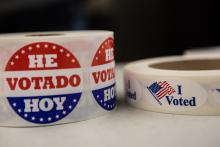Immigration

The day after the election, many top Republicans made statements in support of comprehensive immigration reform. With rising Latino participation in elections, they see the need to work across the aisle for true reform to a broken system.
Those behind a new super PAC want to make sure they are successful. The group, Republicans for Immigration Reform, was formed to give political cover to Republicans willing to support bipartisan immigration reform proposals.

As President Barack Obama prepares for a second term, immigration reform is rumored to be at the top of his agenda. With conservative opinion on the issue shifting, a unique opportunity exists to fix our nation’s broken immigration system. Americans are eager to see the president and Congress make progress on this unnecessarily vexing issue.
The record Latino voter turnout in support of President Obama played a key role in his electoral victory, as he won 71 percent of the vote compared with 27 percent for Gov. Mitt Romney.
These results have provided a catalyst for reenergizing the conversation around comprehensive immigration reform and paved the way for unexpected conversations among conservatives.
Current reports:
“Viewpoint” host Eliot Spitzer and Rep. Luis Gutierrez, D-Ill., a member of the Congressional Hispanic Caucus, react to Mitt Romney’s remark that Latinos — among others — voted for Obama because he gave them “gifts.”
Gutierrez argues that not all Republicans would agree with Romney’s assessment: “There are many, many Republicans who don’t have the view that Mitt Romney has. They’re looking at ways to expand their party.”
And one of these expansion-minded Republicans may be Romney’s former running mate, Paul Ryan. Gutierrez recounts a conversation he had with the Wisconsin congressman this morning on the subject of immigration reform: “You know what Ryan told me? ‘I’m not going to do it because it’s political.’ … He says, ‘I want to do it because it’s the right thing to do.’”
Read more here.
Politico reports:
Americans overwhelmingly support a path to citizenship for illegal immigrants, according to a poll released Wednesday.
Fifty-seven percent of Americans favor creating a path to citizenship, with 39 percent opposed, the ABC/Washington Post survey found. Eighty-two percent of Hispanics support a path to citizenship, compared with 51 percent of whites. Seven in 10 Americans between 18 and 29 support a path.
Hispanic voters were a key part of President Barack Obama’s winning reelection coalition.
Read more here.

The election is finally over, and both parties understand the key role Latino voters played in the outcome. The balance of power in Washington remains the same, but the political winds have shifted dramatically on immigration. During the campaign, President Barack Obama promised to pass immigration reform if reelected. House Speaker John Boehner also recently stated that a “comprehensive approach is long overdue.”
Momentum is building. A new consensus is emerging. Progress is possible.
Christian Post reports:
An evangelical leader in the Southern Baptist Convention has stated that there is a "new opening" for immigration reform at the federal level since last week's election.
Dr. Barrett Duke, vice president for Public Policy and Research at the Ethics and Religious Liberty Commission of the SBC, told The Christian Post about this on Tuesday in an interview. "I think that there has been a new opening come in Congress at this point for a solution to the immigration dilemma that we've been speaking to now for years," said Duke
"There's definitely movement on both sides of the aisle. It's going to take both sides of the aisle to reach a solution that can be passed and we have a unique moment right now to achieve this goal."
Read more here.

Exit polling from Tuesday’s presidential election is offering new hope to activists advocating for comprehensive immigration reform. The Latino community was instrumental in reelecting President Barack Obama, as record numbers turned out to vote and supported the president by over 70 percent. These numbers send a clear message to opponents of immigration reform that demonizing immigrants and blocking progress makes for a poor political strategy.
Pundits are opining that Congress may be more willing to discuss comprehensive reform, a promise President Obama made but has been slow in fulfilling due to congressional opposition. Indeed, republican leaders in Congress have already been altering their positions.

When I go out with my Dad, he often wears a cap identifying him as a Korean War veteran. Over and over again, people tell him, “Thank you for serving.” Over and over again.
I’m always struck by the contrast between that appreciation and the sad, hidden truth about our country’s treatment of some other veterans. I’m speaking of the government’s detention and deportation of many immigrants who served in our armed forces but who are not yet citizens.
The first time I heard about this was 1998. My friend’s husband, a Canadian who grew up in Texas and chose to serve in Vietnam had recently gotten a deportation order based on some old drug charges, the kind of thing many vets experienced. What horrified me then, and still does today, is that immigration judges could not grant an exception. Nothing could stop the deportation except a change in U.S. immigration laws.

Candles burn near the bloodstained concrete sidewalk where a youth was tragically killed when more than a dozen bullets shot across the wall into the Mexican bordertown. I've walked that sidewalk running parallel to the border wall and Calle Internacional in Nogales, Sonora possibly hundreds of times. It is with this intimate awareness of the context that I describe how recent deaths in the name of homeland security are an affront to all families of the borderlands.
Four deaths in six weeks across the border region, one common offender
On the evening of Oct. 10 U.S. Border Patrol agents shot and killed 16-year old José Antonio Elena Rodriguez. The shots were fired through the paneled border wall in Nogales hitting José Antonio in the back seven-to-eight times. The agents allege the boy was involved in rock throwing. For more detailed description of the circumstances, see this article.
About a week earlier, Border Patrol agent Nicolas Ivie, 30, was killed in Naco, another Arizona border town just east of Nogales, when a fellow U.S. agent searching for smugglers mistakenly opened fire. Agent Ivie has a wife and two young daughters who live in southern Arizona, and the family is publicly fundraising to survive without him.

Debates on immigration in the United States continue to move in the default direction of North/South. As such, the prominent debating points often direct public attention to the U.S./Mexico border fence and the Latina/o community. By sleight-of-hand, many in the mainstream media tend to recast a centuries-old U.S. immigration experience as a Latina/o problem.
Unlike the variety of migration stories in the Bible, the forces creating migration for many Latina/o families are closely tied to the issues of power and hyper-consumerism. Often as a last resort do immigrant families enter the northbound currents of low-wage laborers that, as Bishop Minerva Carcaño describes, feed “the economic machine in this country.”
We all know the conversation on immigration in the United States can oftentimes become contentious, with inaccurate portrayals of immigrants inhibiting progress. The most recent attempt to fuel the debate with fear-driven messaging is by NumbersUSA.
A new ad by the organization tries to pit racial groups against each other by suggesting that immigrants admitted to the country on work permits are “stealing” jobs from other racial minorities.
This tactic is hateful, fear-based, and sad. By running this ad NumbersUSA is trying to divide people against each other on racial grounds, sowing hate and division among our neighbors. It misrepresents the truth about immigrant workers and the benefits they provide to our country. It also does nothing to substantively address the issue of unemployment among minorities, a problem we can’t solve by directing hate at one segment of the population.

America is in dire need of comprehensive immigration reform. It is an ethical and moral issue for sure, but it is also an economic one. Our nation’s future economy prosperity depends on migrant labor. Immigration laws that have been passed in states like Arizona, Georgia, and Alabama have severely hurt the state economies, local communities, and small businesses that rely upon migrant workers for farm labor.
The Senior Editor of CNBC.com, John Carney has asserted that there is no crisis related to a shortage of migrant farm workers. Well, to be perfectly blunt, I believe that Mr. Carney is wrong.
What culture war? At a survey release of young evangelicals and proceeding panel discussion, common ground was the pervading theme.
While panelists ranged in religious and political backgrounds — representing groups like Young Evangelicals for Climate Action, World Relief, Family Research Council, USAID, World Vision, the Manhattan Declaration, and Feed the Children — there was an overarching agreement that while young evangelicals are largely pro-life, life issues now extend to beyond the typical to things like creation care and immigration.
“There is still a lot of tension that many young people feel in trying to identify with one political party or the other,” Adam Taylor, vice president of advocacy for World Vision. “… There is a real deep commitment to a pro-life agenda, but that agenda has now expanded and includes a core and strong commitment to addressing issues of poverty.”

"A photograph of bikini-clad pop superstar Katy Perry gets more legal protection in our courts than a Chinese rice farmer trying to avoid deportation back to a totalitarian regime that may kill him."
As a journalist I covered state and federal civil and criminal cases for more than 30 years and only occasionally did I find myself in the U.S. Immigration courts. So when I read California attorney Peter Afrasiabi's book, Show Trials: How Property Gets More Legal Protection in Our Failed Immigration System, I found his comparison to the laws protecting property rights to the immigration laws particularly alarming.
Afrasiabi's book is an eye-opening account of his personal experiences as a lawyer representing men, women and children — families — in some of the most confounding cases one can imagine.
Although the names of his clients have been changed to protect their identities, Afrasiabi bases his analysis of the failure of the immigration system on actual cases that he personally handled.

The words we use are powerful, especially when it comes to talking about people created in God’s image. Word choice shapes how people perceive events and respond to the arguments made by people in the public arena. As Christians, we are called to speak up when our society uses language that dehumanizes and degrades our brothers and sisters.
Journalists and others in the media should be the first to understand this phenomenon. Unfortunately, reporters from TV stations and newspapers still label undocumented immigrants as “illegal.” This dehumanizing term robs people of their dignity and prejudices readers against the real needs of immigrant communities.
These reporters often follow the standards set by the Associated Press Stylebook, which is the authoritative guide for journalists across the country on everything from punctuation to word choice. &Nbsp;

Last week, I attended the 9th Annual Immigration Law and Policy Conference at Georgetown University Law Center, where a number of senior government officials, policy experts, academics, and advocates discussed one of the most paralyzing issues of our time —immigration.
As each panelist attempted to provide their thoughtful legal and policy analysis on a number of issues like immigration enforcement, the federal government’s responsibility on immigration policy, and litigation developments, the differences in opinion between the speakers quickly emerged, even though there was consensus that immigration reform is significantly needed in our country.
Many agreed that the issue of immigration is of staggering complexity. The solution that is developed by the federal government must be a conglomeration of multifaceted mechanisms that address the brokenness of our current system at the policy, legal, and administrative level. This comprehensive solution must also be a clear reflection of the historical context we currently live in since it’s not in our best interest to use an outdated system from the past as an exemplary model for the future.

Last night millions of Americans watched the first Presidential debate of the 2012 election season. During the 90-minute debate, there were significant policy discussions about a range of issues, deep disagreements between the two candidates, and even a threat to Big Bird’s job security.
Yet despite all the arguing there was much left unsaid by President Barack Obama and Gov. Mitt Romney.
Two words are dominating our current political dialogue: jobs and economy. Everyone seems to want more of the former and a quicker revival of the latter. Logically then, our nation should take any and all sensible and easy steps towards achieving those goals. If those actions also had positive humanitarian and moral outcomes, even better, right?
Sadly, Washington seems to be devoid of logic these days. The Center for American Progress has released a study showing that passage of the DREAM Act would create an economic boom of over $300 billion dollars and create nearly 1.5 million jobs — not to mention, it is just the right thing to do.
The politics needs to stop. The DREAM Act needs to pass. Read more about the economic difference it could make if Washington would take action by clicking HERE.

A soft answer turns away wrath, but a harsh word stirs up anger. Proverbs 15:1
I often wonder how frequently people think about the impact their words have on others, specifically, on the development of human perception. The conclusion I’ve sadly reached is that when a language norm is established by dominant cultural forces —such as the news media, in our day – the truth seldom matters. Once something is spoken and repeated enough times people consider it to be true regardless of the real facts or circumstances.
One recent debate clearly illustrating the power of words is around which terminology the media should use when referencing immigrants who are in this country without authorization to work. Those outlets that use the word “illegal” defend this practice by pointing to the Associated Press’ Stylebook, which designates “illegal” as the appropriate term. Those using the term “undocumented” have noted the changing circumstances within the culture and recognize that using such inflammatory terminology only adds fuel to the proverbial political fire around the issue of immigration.

Congress is due to recess soon, but members are trying to pass a bill attempting to increase the availability of high-skilled visas for the tech industry before adjourning at the end of this week. While different versions of the legislation exist, the fundamental goal is to allocate more visas to foreign-born graduates of U.S. universities who have obtained a master’s or doctorate degrees in science, math, technology or engineering (STEM) fields.